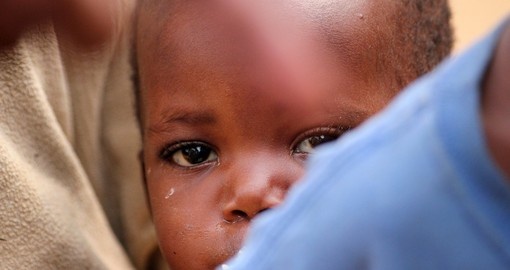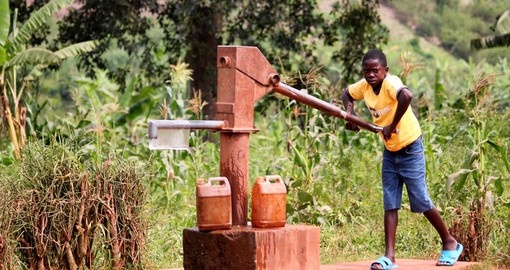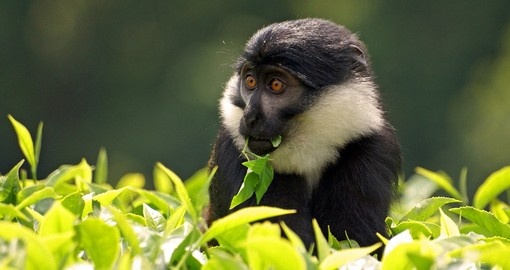Rwanda History
The first inhabitants of Rwanda were the Twa Pygmies who were displaced by larger groups of Hutu people from around 1000 AD and onwards. The late 13th century witnessed the arrival of the Tutsi tribes who came from the south, conquering the populations that had already settled in Rwanda. The Tutsi people established a feudal kingdom that was unmatched anywhere else in Africa outside of Ethiopia. As a result of this feudal kingdom, the authority of the Rwandan king was very powerful.
The Rwandan population was a mixture of eighteen different tribes. Of these tribes, the Tutsis were the wealthiest, the Hutus were the farmers and the Twa Pygmies were the marginalized group. The colonial period began after the Berlin Conference of 1884 annexed Rwanda as part of German East Africa. The Germans began to arrive in 1890 and remained there until 1916 when they were forced to surrender to Belgian forces during the First World War. Under Belgian rule, Tutsi power increased.
In 1956, Mwami Rudahigwa (the Tutsi monarch) desired independence. In response, the Belgians switched their allegiance to support the Hutu population who preferred to have a democracy before independence. In 1959, after the death of Mwami Rudahigwa, fighting broke out between the two tribes. Many Tutsi fled to Uganda, Kenya and Tanzania. Independence was eventually granted in 1962 and power was given to a Hutu majority under Prime Minister Gregoire Kayibanda.
Things quickly began to change for the Tutsi in Rwanda; quotas were put in place that limited their opportunities for education and work. In response, Tutsi exiles began to launch guerilla raids from Uganda. Thousands were killed and many Tutsi fled. After a Hutu massacre in neighbouring Burundi in 1972, old hatreds remerged. Major General Juvenal Habyarimama (the Defense Minister) aimed to rid Rwanda of Kayibanda. Initially, Habyarimama made some advances in uniting the country but this progress was short-lived.
October 1990 witnessed 5,000 well-armed rebels from the Rwanda Patriotic Fund (RPF),a Tutsi military front, invaded Rwanda. Habyarimana received support from France, Belgium and the Democratic Republic of Congo (DRC) to put the rebels down, however, they attacked again in 1991. Eventually, a ceasefire was established and both sides were given no choice but to enter into negotiations. A peace accord was signed between the Hutu government and the RPF in August 1993. Unfortunately, by 1994, fighting erupted again with approximately 800,000 Rwandans being killed within three months. Three million people fled to refugee camps in Tanzania, Uganda and the DRC and it is estimated that some seven million people were displaced.
On 6 April 1994, Habyarimana and Cyprien Ntaryamira, the president of Burundi, were killed when their plane was shot down on return from peace talks. Although no one is entirely certain of who fired the shots, many people believe it was Hutu extremists. Devastating massacres followed as the most extreme of Habyarimana’s government sought to rid the country of all Tutsi and Hutu reformists.
The Rwandan army and Interahamwe death squads ran rampant over the country killing at will. An ineffective mandate prevented the UN Assistance Mission for Rwanda (UNAMIR) from acting, rendering them powerless and the international community seemed to ignore Rwanda’s plight. The UN was finally reinforced in July 1994, but it was too late. The RPF took control in Kigali.
The International Criminal Tribunal for Rwanda was established in November 1994 with the goal of bringing former government and military personnel to justice for acts of genocide. Many people were sentenced and Prime Minister Jean Kambanda filed a guilty plea. Kambanda received the first-ever conviction of a head of state for the crime of genocide.
Rwanda has made tremendous steps since the atrocities of 1994 and today enjoy a remarkable degree of stability and security. Healing has begun between the Tutsi and Hutu populations at the hands of the RPF whose goal is to create a community of Rwandans, irrespective of tribe. The Rwandan genocide will never be forgotten and memorials are found throughout the country as a reminder to ensure such actions never happen again.
During the 2000s, Rwanda’s economy, tourist numbers and Human Development Index grew steadily and the poverty rate decreased between 2006-2011. Sustainable development and conservation are at the forefront of the government and eco-tourism is highly encouraged with many tourists arriving to view the rare and fascinating mountain gorillas that call this equally fascinating country home.
Rwanda Travel Information
At Goway we believe that a well-informed traveller is a safer traveller. With this in mind, we have compiled an easy to navigate travel information section dedicated to Rwanda.
Learn about the history and culture of Rwanda, the must-try food and drink, and what to pack in your suitcase. Read about Rwanda's nature and wildlife, weather and geography, along with 'Country Quickfacts' compiled by our travel experts. Our globetrotting tips, as well as our visa and health information will help ensure you're properly prepared for a safe and enjoyable trip. The only way you could possibly learn more is by embarking on your journey and discovering Rwanda for yourself. Start exploring… book one of our Rwanda tours today!
Extend Your Trip
After your Africa tours, why not consider one of Goway's Europe tours or Egypt tours en route from Rwanda or perhaps a stopover in Dubai on one of our United Arab Emirates tours
Book your Rwanda tour with Goway!
 AfricaExperts is the exclusive division of Goway that specializes in planning and organizing Rwanda tours and experiences. Choose from a locally escorted tour, a gorilla encounter safaris, or one of our active and adventurous tours and more. We want to be your first choice when next you go globetrotting to Rwanda.
AfricaExperts is the exclusive division of Goway that specializes in planning and organizing Rwanda tours and experiences. Choose from a locally escorted tour, a gorilla encounter safaris, or one of our active and adventurous tours and more. We want to be your first choice when next you go globetrotting to Rwanda.
Get a Trip Quote Order a Brochure



















